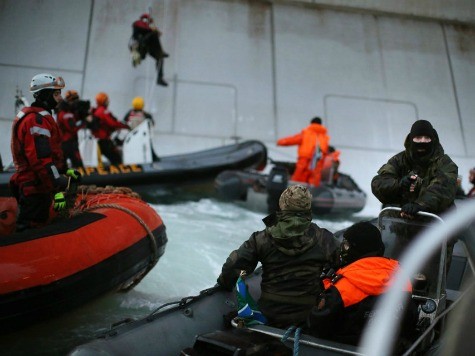Russian President Vladimir Putin has softened the Russian approach toward Greenpeace activists who were seized by the Russian Coast Guard after they attempted to board a Russian offshore oil platform in the Arctic. Putin said Wednesday that the activists aren’t pirates, but defended their seizure by claiming the Coast Guard couldn’t determine who they were.
Two activists were detained Sept. 18; the next day, the Coast Guard seized Greenpeace’s ship, the Arctic Sunrise, and towed it to Murmansk with 30 more activists from 19 countries on board.
At a conference on Arctic affairs, Putin said that “it’s completely obvious they aren’t pirates… (the officers) didn’t know who was trying to seize the platform under the guise of Greenpeace. Especially in view of the events in Kenya, really, anything can happen.”
Greenpeace was furious with the detention saying Russia had no right under international law to board their ship and no grounds to file piracy charges. Ivan Blokov, campaign director at Greenpeace Russia, declared, “Charging us with piracy is absurd. Greenpeace holds non-violence as a key principle of its work and we are being charged with something that involves violence.”
But Vladimir Chuprov, head of the energy department at Greenpeace Russia, was obviously happy that Putin was softening, as the activists could face 10-15 years in prison if convicted of piracy. He said on Wednesday, “We’re ready for dialogue, and I hope they will hear us.” He also said that the Arctic Sunrise had not violated the Russian three-mile security zone.
The platform, owned by the Russian State Gazprom, the largest extractor of natural gas in the world, is the first offshore rig in the Arctic, created in the Prirazlomnoye oil field in the Pechora Sea in 2011. Gazprom said recently that it would start pumping oil this year; it has taken this long to meet the technological challenges to bring the rig online.
Blokov asserted that none of the activists have seen a lawyer; one has met with a consular official.

COMMENTS
Please let us know if you're having issues with commenting.